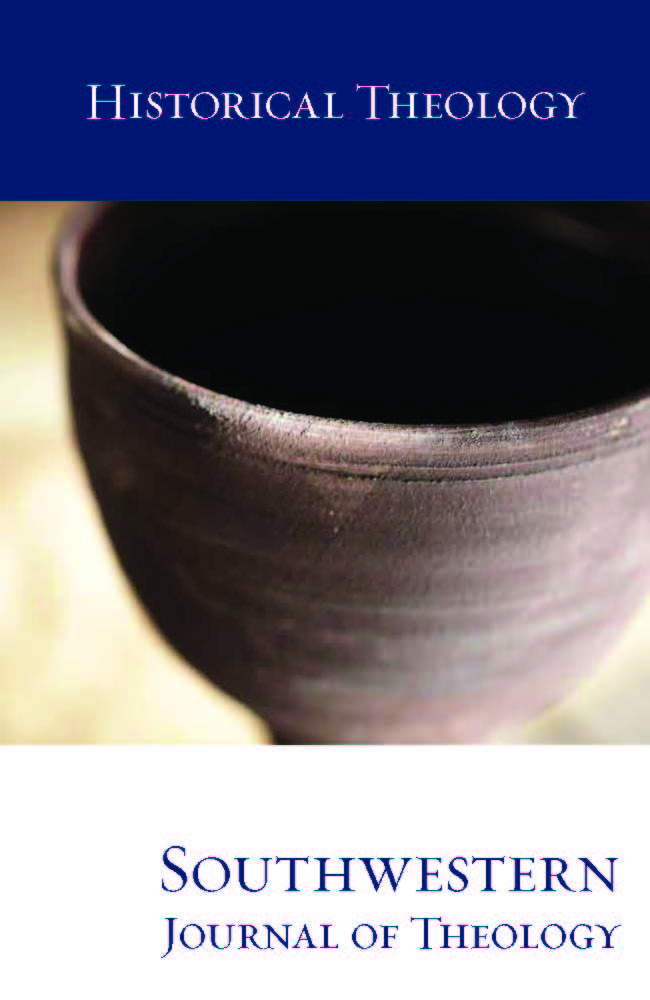
Historical Theology
Southwestern Journal of Theology
Volume 57, No. 2 – Spring 2015
Managing Editor: Terry L. Wilder
By David Vincent Meconi, SJ. Washington, DC: The Catholic University of America Press, 2013. 280 pages. Hardcover, $64.95.
Not a few scholars have produced insightful articles on Augustine’s doctrine of deification. However, Meconi’s The One Christ is the first book which is thoroughly dedicated to the North African bishop’s understanding of deification and recognizes the doctrine of deification as “the one constant theological principle” in Augustine’s theology, not as an element of his soteriology or anthropology (xvi). Refuting Mausbach and others who argue for Augustine’s isolation from the theological world of the Eastern Church and for his ignorance of the idea of deification, Meconi claims deification is “a central doctrine in the overall thought of St. Augustine of Hippo” (xii). Without a proper understanding of the importance of deification in Augustine’s theology, his readers might fail to grasp how other Christian doctrines are related to salvation.
In contrast to many scholars that emphasize the soteriological element of deification in Augustine, Meconi begins his discussion with the bishop’s understanding of creation. Since creation is the work of the triune God, it reflects the interrelationship of the three Persons in the one Godhead. As the Son eternally adheres to the Father in his love, so creation that came from the Son should imitate the Son’s adherence to the Father for its continual reception of life. The continual existence of creation also depends on the Spirit who allows it to participate in the divine “immutability and permanence” that the Father and the Son share with each other (13). Therefore, the voluntary participation of humans in the divine life was a cosmological expectation prior to a soteriological goal. Deification was God’s original plan for his creation of human beings. That Adam and Eve were condemned was not because they desired to be gods but because they attempted to be gods in their nature without their obedient participation in God. The more we sin, the more we become unlike God (74). In Sermon 23B, Augustine again wants to make sure that deification does not mean either the loss of one’s own nature in its process. As Christ did not cease being God in his incarnation, man does not cease being human in his deification. The personal distinction within the unity of the Godhead also shows that deification, union between God and creation, should not mean the loss of the otherness either of God or of creation.
Meconi notices that Augustine’s deification is recapitulative as is Irenaeus’ deification. When explaining the purpose of the incarnation, Augustine repeated Irenaeus’ phrase exactly—God became man so that man can become God. Christ as the second Adam came to restore human beings to their original destiny of becoming gods. Augustine’s recapitulative deification was his theological means to refute the Manichaean separation between the Creator and the Savior (100). Interestingly, Meconi also observes that Augustine’s controversy with Pelagianism affected the way he presents deification. In opposition to the Pelagians’ realized deification that considered Christians as already perfect like Christ, Augustine intentionally avoided mentioning 2 Peter 1:4 and had to emphasize the sovereign grace of God rather than human cooperation and “predestination rather than participation,” although continually speaking of deification during his controversy with Pelagianism (132). Refuting Patricia Wilson-Kastner and Daniel Keating who do not see the meaningful role of the Holy Spirit in deification, Meconi rightly reminds his readers of the Holy Spirit’s role as the personal bond between the Father and the Son in the immanent life of the Trinity and between the church and God in the economic life of the Trinity. As the eternally personal glue between the lover and the beloved one, the Spirit leads Christians to the unity of the divine Persons in the Trinity.
Some might detect one seemingly inconsistent argument in Augustine’s doctrine of deification. On one hand, the bishop always tried to preserve a qualitative difference between the union between Christians and Christ and the union between humanity and divinity in Christ. Since “the entire fullness of divinity” is only found in Christ, and the incarnation of God cannot be “inimitable,” Christ alone will remain the only begotten Son of God by nature (201). For Augustine, participation means not only that the participant “shares in the attributes of the other,” but also that “the participant never becomes identical with or absorbed into the one in whom it participates” (51). On the other hand, Augustine also argues that deified Christians are “other Christs (alter Christus)” as if there is no ontological differentiation between Christians and Christ (202). However, what the bishop means by “other Christs” is only in the sense of “the totus Christus (the whole Christ),” in other words, Christ with his church (202, 206).
This reviewer appreciates Meconi’s efforts to understand Augustine’s doctrine of deification in light of his overall theology. This book will be a great resource for anyone who wants to study Augustine’s doctrine of deification.





